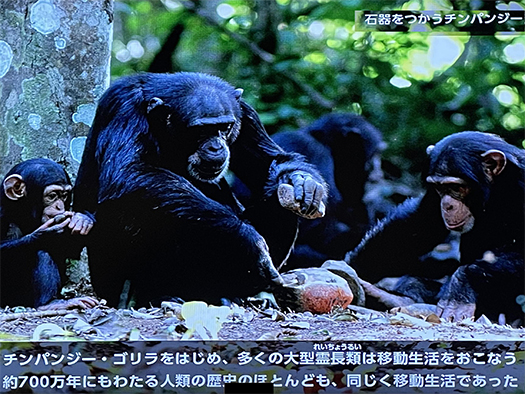
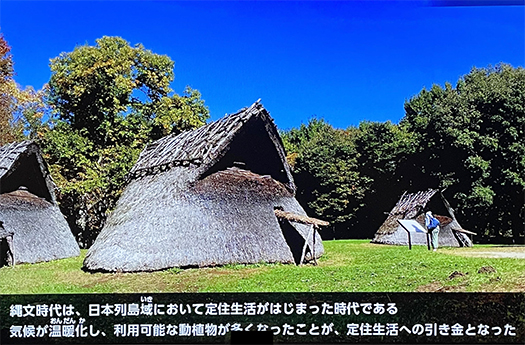
わたしたちは歴史を学んでいるけれど、それは文字に記録された以降が中心。
史という文字自体「できごとを書きしるした書。時勢の変遷・発達の過程の記録。」
という解釈が一般的であり、もっと深いところでの語彙的には
「書きしるす役人。書き役。ふびと。文章にたずさわる人。」という語感。
そもそも文字とは農耕社会の必要性から発生したモノと考えられるので
それ以前の移動生活についての解明動機には即していない。
そして文字記録によって人類の思考法も大変容したに違いなく、
「学習する」営為に対して最適化された思考体系のように思える。
どうもこの「移動生活から定住生活」へのパラダイムシフトの意味合いが
十分に自覚的なレベルになっていないように思えてならない。
思考のツールとしての文字自体が定住・農耕社会以降の人類体験であって
それ以前の人類的思考方法について考えるときに適していないようにも思える。
現生人類でも7-8万年の時間、それ以前の人類時間数百万年、
わたしたちの潜在意識領域、DNA領域では移動生活がアプリオリ。
最初の写真図のように類人猿種として移動が普遍的なのだ。
定住はどう考えても1-2万年程度の「ごく最近」はじめたことは明らかなのだ。
しかし、人類進化の相当大部分は定住以降に発現した。
定住にはそれだけの大進化を促すものがあったということができる。
日本列島というわかりやすい環境の中でこの大進化もあったことで
わたしたちは具体的にこの領域を解明することができるのではないか。
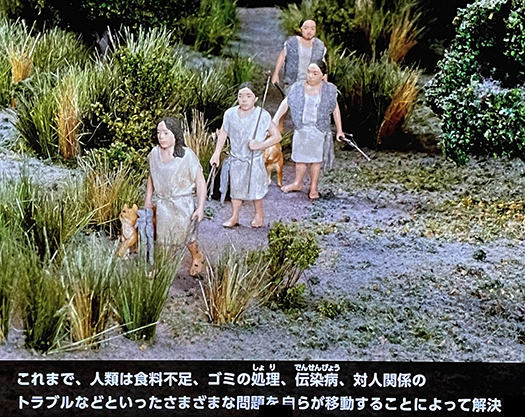
そんなことに考えが向かっていて、気付かされたのが上のパネル。
上には「これまで人類は食糧不足、ゴミ処理、伝染病、対人関係トラブルなどの
さまざまな問題を、自ら移動することによって解決してきた」とある。
・・・すごいヒントに満ちているのではないか。
温暖化によって食糧確保の手段が大変化したことで定住の方が合理的になった。
基底的にはこの条件変化が最大要因だろう。
それ以外の問題については「逃げること」での解決が人類普遍だったけれど
そのことに人類は正面から向き合うことを余儀なくされたとも考えられる。
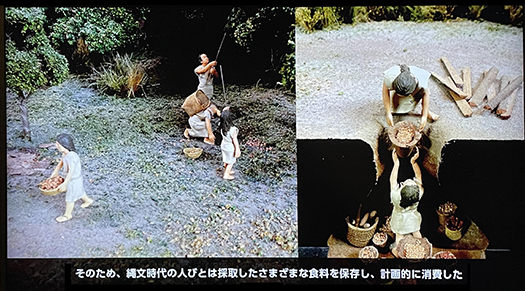
もちろん食糧確保についてもこのジオラマのような事実があっただろう。
貯蔵という主目的が発生したことで日本列島での定住とワンセットの
「縄文土器」の出現とが劇的に符合する。
そして定住後に発生した「社会」ではさまざまな移動生活との相違、
考え方レベルのパラダイムシフトに対応して根底的変化が生まれていったのだろう。
移動生活では先験的に解決できていた問題が
様相を変えて人類に襲いかかり、そこからの解決策を人類は模索した。
そのことがさまざまな社会ルールの創始、
そして祭祀・集団的精神性への意識集中にもなったと思える。
English version⬇
The 37,000-Year History of the Japanese Islands: The Transformation of Human Culture from Migration to Settlement.
The emergence of “storage” earthenware coincided with settlement. The dramatic shift in diet resulted in a head-on confrontation with a problem that had been solved naturally by migration.
We study history, but it is mainly what has happened since it was recorded in writing.
The word “history” itself is “a written record of events. A record of the process of change and development of the times.
In a deeper lexical sense, the word “history” is generally interpreted as “a written record of events.
The term “history” itself is generally interpreted as “a record of events written in writing. A written official. A person who takes part in writing. A person engaged in writing. The word “scribe” is used to refer to a person who is involved in the writing process.
Writing is thought to have arisen out of the necessity of an agricultural society, so it is not in line with the motive for elucidating the mobile life before that.
It is not in line with the motive of elucidating the mobile life of people before that time.
The human way of thinking must have been greatly transformed by the written records, and it is not possible to optimize the activity of learning.
It seems to be a thought system optimized for the activity of “learning.
It seems that the implications of this paradigm shift from a mobile life to a sedentary life have not yet reached a sufficiently conscious level.
I do not think that the significance of this paradigm shift from a mobile to a sedentary life has yet to reach a sufficiently conscious level.
Writing itself, as a tool for thinking, is a human experience after sedentary and agrarian societies.
It does not seem to be suitable for thinking about the human way of thinking before that time.
Even the present humans have been living for 70,000-80,000 years, and the millions of years of human time before that.
In our subconscious and DNA realms, mobile life is a priori.
As shown in the first photo, migration is universal for ape species.
It is clear that settlement began “very recently,” in the order of 10,000 to 20,000 years.
However, a significant portion of human evolution occurred after settlement.
It can be said that settlement had something to promote such a large evolutionary change.
The fact that this great evolution also took place in the easy-to-understand environment of the Japanese archipelago makes it possible for us to elucidate this area in concrete terms.
We may be able to elucidate this area in concrete terms.
As my thoughts turned to this, I was reminded of the two panels above.
The top panel reads, “Up to now, humans have solved various problems such as food shortage, waste disposal, infectious diseases, and interpersonal problems by moving around on their own.
human beings have solved various problems such as food shortage, garbage disposal, infectious diseases, and interpersonal problems by moving around by themselves”.
This is a great hint, isn’t it?
Global warming has made it more rational for people to settle down as the means of securing food has become more difficult.
This change in conditions is probably the most important factor.
As for other problems, “escape” has been the universal human solution.
It can be thought that humanity was forced to face these issues head-on.
Of course, there would have been facts like this diorama about food security.
The main purpose of food storage was the emergence of the “Jomon Pottery,” a set of tools used for settling in the Japanese archipelago, and the emergence of the Jomon Earthenware.
The appearance of “Jomon earthenware” dramatically coincides with the main purpose of storage.
The “society” that emerged after the settlement of the islands was different from the mobile lifestyle, and it corresponded to a paradigm shift in the level of thinking.
The “society” that emerged after the settlement of the islands must have gradually undergone fundamental changes in response to the paradigm shift in the level of thinking and to the various differences from the mobile lifestyle.
Problems that had been solved a priori in the mobile life
The problems that could be solved a priori in the mobile lifestyle were transformed, and humanity sought solutions to them.
This led to the creation of various social rules
and the concentration of consciousness on rituals and collective spirituality.
Posted on 11月 17th, 2022 by 三木 奎吾
Filed under: 日本社会・文化研究, 歴史探訪


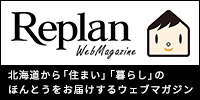
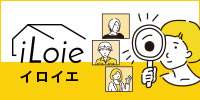



コメントを投稿
「※誹謗中傷や、悪意のある書き込み、営利目的などのコメントを防ぐために、投稿された全てのコメントは一時的に保留されますのでご了承ください。」
You must be logged in to post a comment.